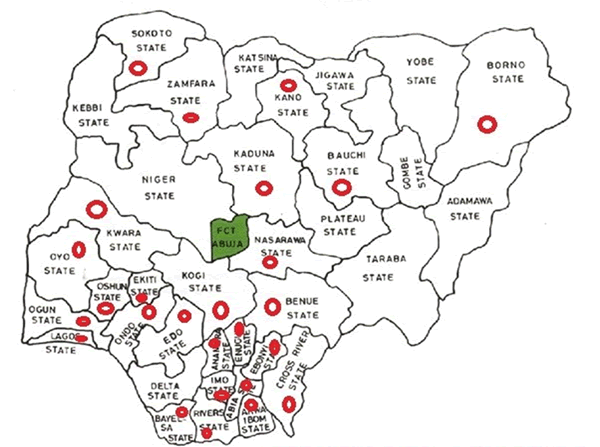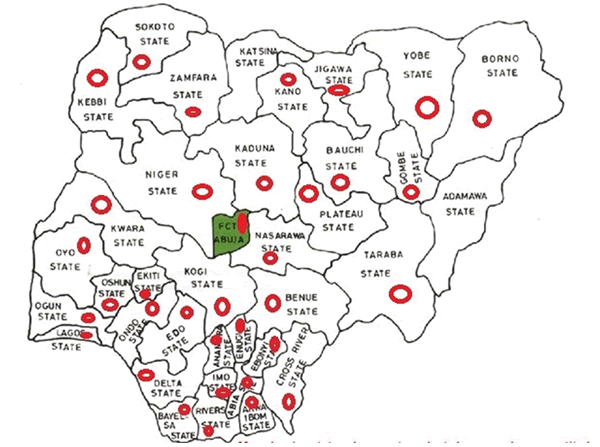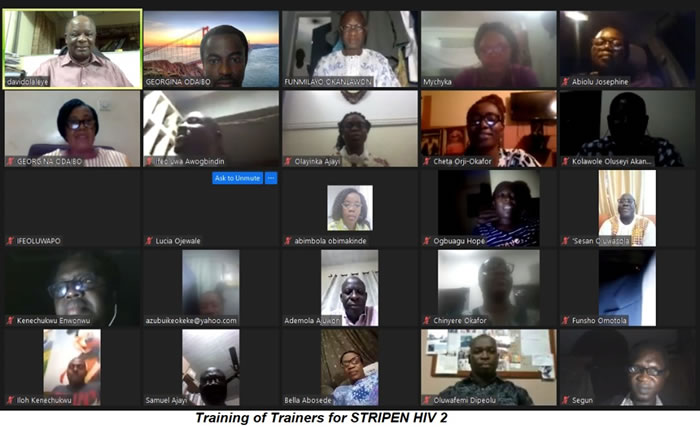 KEY PERSONNEL: Prof. David Olaleye* (PI), Prof Georgina N. Odaibo (PD and Training Coordinator), Prof. Funmilayo Okanlawon (Co-PI), Dr Samuel Ajayi (Co-PI), Dr Charity Nwankwo (Co-PI), Mrs. Bose Bella (Finance Administrator), Mr. Seun Falayi (eLearning Coordinator)
KEY PERSONNEL: Prof. David Olaleye* (PI), Prof Georgina N. Odaibo (PD and Training Coordinator), Prof. Funmilayo Okanlawon (Co-PI), Dr Samuel Ajayi (Co-PI), Dr Charity Nwankwo (Co-PI), Mrs. Bose Bella (Finance Administrator), Mr. Seun Falayi (eLearning Coordinator)
*Prof. Olaleye passed unexpectedly in July 2021. As a mentor, teacher, researcher, and physician, he was a great leader in Nigeria and to AFREhealth. Prof Olaleye is pictured top left on page 5.
PROJECT TITLE: Strengthening Interprofessional Education for HIV Care in Nigeria (STRIPEN-HIV)
PROJECT YEAR 1 RECAP: A total of 249 learners, 156 final year and 93 newly graduated health care workers, were trained in six collaborating institutions (MEPIN Schools). 36 facilitators from these institutions, and located in the six geopolitical zones of Nigeria, were trained on the use of the STRIPE-HIV modules and facilitated learner workshops on ten selected modules (4 compulsory and 6 others). Data from pre and post tests showed that learners' knowledge improved significantly for the compulsory modules.
One of the major success stories is the resulting pool of trained facilitators and learners on interprofessional education in six geopolitical zones in Nigeria; this will help to achieve rapid scaling up of interprofessional education throughout the country. The University of Ibadan students won the UCSF STRIPE short video competition award.
PROJECT YEAR 2 SUMMARY: The STRIPEN-HIV team successfully recruited 572 learners from 40 training institutions and 190 health facilities across different states and geopolitical zones. During each of the six training workshops, 36 facilitators taught eight modules (four compulsory and four optional) over the course of 2 consecutive Saturdays. Learners focused on four modules per week, using the AFREhealth online course platform to review material prior to the Saturday Zoom discussions, when they were placed into mixed interprofessional working groups. Learners testified acquisition of new knowledge and found the sessions interactive.
MAIN ACCOMPLISHMENTS
- Established an interprofessional community of practitioners made up of learners and facilitators from the 6 geopolitical zones in Nigeria, including 40 training institutions and 190 health facilities.
- A greater number of facilitators were trained (36) than originally targeted (32).
- Created a pool of trained facilitators with experience in facilitating online courses for similar trainings at their institutions.
CHALLENGES AND SOLUTIONS
- Unstable internet networks and exhausted data bundles, due to the length of the training, impacted learner progress through the course. Learners were encouraged to be in a network-friendly environment and provided with data bundles to support effective participation.
- As some learners did not review the modules before the Zoom meeting, facilitators began encouraging learners to review modules at least 72 hours before each class.
- Discussing four modules per day did not allow for in depth deliberation of each topic; it was decided to limit Zoom sessions to two modules in subsequent trainings.
- To support registration challenges and communicate directly with learners, a WhatsApp group, Telegram page, and additional information sessions were established.
- Regular STRIPEN-HIV Zoom meetings were held to communicate with facilitators.
TRAINING PARTNERS: STRIPEN-HIV recruited nation-wide recruitment of pre-service learners (Figure 1) in partnership with five collaborating institutions:
- University of Lagos
- University of Nigeria, Nsukka
- Ahmadu Bello University
- University of Jos
- University of Calabar
Figure 1. Map showing states where pre-service learners were recruited

PARTICIPATING CINICAL SITES: Working health professionals joined the training from 190 health facilities, 27 of which receive PEPFAR support (Figure 2). A complete list of the 190 health facilities is available upon request.
Figure 2. Map showing states where post-graduate learners were recruited

IMPLEMENTATION
- Training cohorts: 6
- Facilitators Trained: 36 facilitators worked in pairs (18 pairs)
|
Health Profession |
Years of Experience |
Gender |
Teaching Experience |
||||
|
Medical |
11 |
0-5 years |
3 |
Male |
19 |
HIV educator |
35 |
|
Nursing/Midwifery |
8 |
6-10 years |
7 |
Female |
17 |
Non-HIV educator |
1 |
|
Pharmacy |
5 |
> 11 years |
26 |
Additional |
0 |
||
|
Laboratory |
8 |
||||||
|
Other |
4 |
||||||
- Learners trained: A total of 572 Health Professionals were trained
|
Medical |
Nursing/Midwifery |
Pharmacy |
Laboratory |
Other |
Total |
|
|
Preservice |
67 |
42 |
30 |
37 |
13 |
189 |
|
Postgraduate < 12 months |
25 |
23 |
31 |
81 |
10 |
170 |
|
Postgraduate > 12 months |
32 |
19 |
30 |
110 |
22 |
213 |
|
Total |
124 |
84 |
91 |
228 |
45 |
572 |
- Distribution of Learners by Gender
|
Gender |
|
|
Male |
299 |
|
Female |
273 |
INNOVATING HIV TRAINING DURING COVID-19: Instead of hard copy, E-flyers and emails were used to recruit learners, to ask employers to nominate employees, and to distribute registration information among health care workers. As training was completed during the COVID-19 lockdown, it was conducted online via the AFREhealth LMS and learners participated in their respective locations using Zoom and WhatsApp, in addition to the LMS. Learners were provided data to take care of the cost of internet access during the training.
BROADER IMPACT: Partner institutions have opted to adapt an interprofessional approach to non-STRIPE courses commonly offered to students of various health professions. These courses will most likely be delivered online because of the number of students expected to take them. From learner perspectives, the knowledge and skills on interprofessional education acquired during the training has positively impacted their work, including patient care and management, as well as the organization of program teams at MOHs or NGOs. Most facilitators have also decided to employ an online, or a hybrid of an online and in-person approach, in their teaching.
IMPACT VIGNETTES
Learners
- “In fact, the program is highly educative, effective, informative and interesting.
I really enjoyed the interactive session…. God Bless the organizers of the programme!” - “It was an impactful moment. I never regret applying for the course. Thanks to our facilitators, they both did a great job.”
- “My experience with the training surpassed my expectation, in fact I cannot wait till next week for the completion of the training.”
Facilitators & Program Team
- “IPE is the missing link to fostering a working relationship/team spirit among health care providers which offers a wholistic approach to care for PLWHA and patient care in general.”
- “The virtual interprofessional training allows wide participants coverage because of its convenience. Participants can take their courses right from the comfort of their homes. However, the network issue is a major challenge in ensuring that the main objective of STRIPE HIV training is achieved.”
- “The online training was a novelty for most of the learners. It was their first time of experiencing a variety of student-centered teaching methods such as role play, group discussion, among others, employed virtually.”
- “Virtual/online classrooms bridge the geographical boundary. Participants use the platform to work with other healthcare workers with mutual respect and shared values through team-based care to ensure high-quality HIV care in the case studies.”
PROGRAM PICTURES









